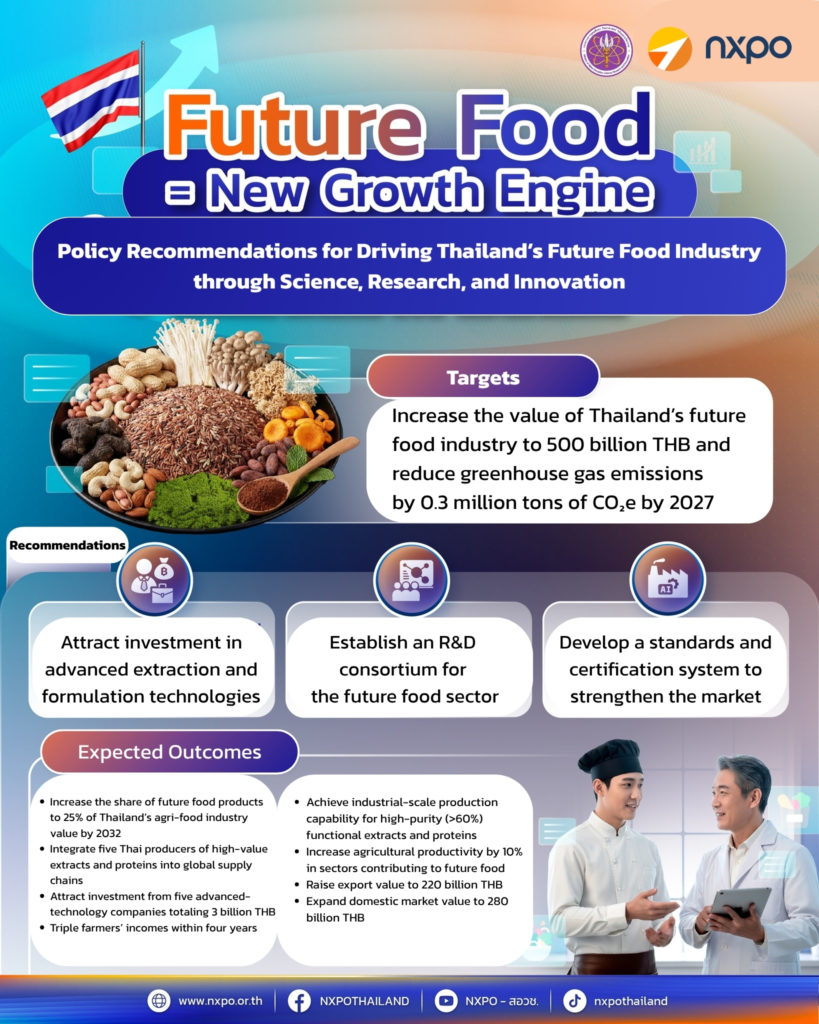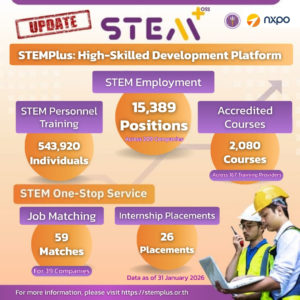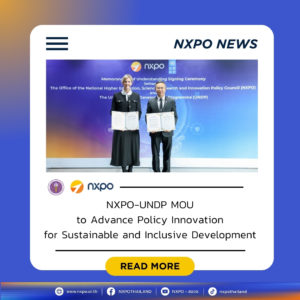In today’s world, food must be more than just delicious — it must also be sustainable. To support this transformation, NXPO is driving the future of Thailand’s food industry through science, research, and innovation.

The agriculture and food industries are key pillars of Thailand’s economy, contributing around one-seventh of GDP, nearly one-fifth of total exports, and employing over one-third of the national workforce. However, global megatrends — including geopolitical tensions, climate change, trade restrictions, and an aging population — are posing significant challenges. Thailand must therefore act swiftly to navigate both the risks and opportunities these shifts bring.
“Future Food” refers to food that is nutritious, safe, and sustainably produced through the application of science, technology, and innovation. It can be classified into four key categories: 1) Health foods and functional ingredients, 2) Medical and personalized foods, 3) Organic and clean foods, and 4) Alternative proteins.
Thailand is blessed with diverse and abundant agricultural resources to support future food development. Examples include pigmented rice, modified cassava, cocoa, tea, coffee, coconut, herbs, and other bio-based materials — all of which can be transformed into high-value products such as vitamin-fortified and probiotic beverages, or alternative proteins derived from soybeans, mung beans, duckweed, mushrooms, edible insects, and local seaweed.
However, Thailand’s future food industry still faces critical bottlenecks across the value chain of functional ingredients and proteins. Challenges include inefficient raw material management (upstream), limited domestic production capacity (midstream), and insufficient research and clinical validation of bioactive compounds from local materials (downstream). To achieve sustainable growth, Thailand must strengthen its capabilities across the entire value chain — reducing import dependency, enhancing competitiveness, and improving linkages between research, innovation, and industry.
To address these gaps, NXPO has developed the “Policy Recommendations for Driving Thailand’s Future Food Industry through Science, Research, and Innovation.” The initiative aims to transform Thailand’s agri-food production and export systems to meet future market demands, build technological capacity, and position future food as a new growth engine for the agri-food sector. The targets are to increase the value of Thailand’s future food industry to 500 billion THB and reduce greenhouse gas emissions by 0.3 million tons of CO₂e by 2027.
The policy document outlines three key actions:
1. Attract investment in advanced extraction and formulation technologies
Strengthen Thailand’s midstream industries for functional ingredients and proteins by promoting investment through the Board of Investment (BOI). Incentives should focus on companies with advanced technologies for producing high-value functional ingredients and proteins.
2. Establish an R&D consortium for the future food sector
Build research and development networks for functional ingredients and protein production, supported by the Science, Research and Innovation Promotion Fund, to enhance coordination and collaboration between academia and industry.
3. Develop a standards and certification system to strengthen the market
Upgrade food and beverage standards and certification systems for health and functional products. Launch a regulatory sandbox — “FFC Thailand Sandbox” — to streamline the process for health-related functional claims in agricultural and food products, and establish positive lists to facilitate future food registration.
These actions are expected to increase the share of future food products to 25% of Thailand’s agri-food industry value by 2032, delivering significant impacts including:
- Integrate five Thai producers of high-value extracts and proteins into global supply chains
- Attract investment from five advanced-technology companies totaling 3 billion THB
- Triple farmers’ incomes within four years
- Achieve industrial-scale production capability for high-purity (>60%) functional extracts and proteins
- Increase agricultural productivity by 10% in sectors contributing to future food
- Raise export value to 220 billion THB
- Expand domestic market value to 280 billion THB
Download the full document (in Thai): Policy Recommendations for Driving Thailand’s Future Food Industry through Science, Research, and Innovation







